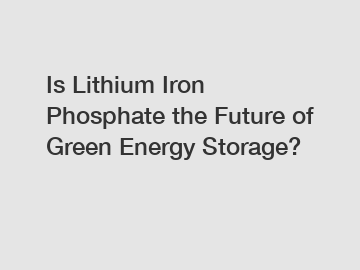Is Lithium Iron Phosphate the Future of Green Energy Storage?
Amidst the evolving landscape of renewable energy, the search for efficient and sustainable energy storage solutions has become more pressing than ever. Traditional lithium-ion batteries have played a significant role in this space, but recent advancements have brought forth a promising alternative - Lithium Iron Phosphate (LiFePO4). With its exceptional qualities, LiFePO4 holds the potential to revolutionize green energy storage, paving the way for a cleaner and more sustainable future.
Harnessing the Power of LiFePO4:
LiFePO4 batteries offer several key advantages over conventional lithium-ion batteries, making them an attractive choice for green energy storage. The fundamental strength lies in their inherent safety features. Due to its unique chemical composition, LiFePO4 is highly resilient to thermal runaway, reducing the risk of fire or explosion. This characteristic allows for safer and more reliable energy storage, particularly in large-scale installations.

Furthermore, the high energy density of LiFePO4 batteries ensures efficient power delivery over extended periods. These batteries can sustain a larger number of charge and discharge cycles without significant capacity degradation. Consequently, they offer long-lasting performance and are particularly well-suited for applications requiring frequent cycling, such as electric vehicles (EVs) and grid-level energy storage.
The Promise of Sustainability:
Sustainability lies at the core of LiFePO4's appeal. Lithium, iron, and phosphate are abundant and widely available minerals, vastly reducing concerns about resource scarcity. Moreover, the production process for LiFePO4 batteries is environmentally friendly, involving fewer harmful materials compared to other lithium-ion battery chemistries.
Additionally, LiFePO4 batteries have a superior life cycle, which further contributes to their sustainability. With a shelf life of up to 20 years, LiFePO4 batteries outperform traditional lithium-ion batteries, reducing the need for frequent replacements and minimizing waste. This longevity ensures a reduced carbon footprint throughout the battery's lifespan, making it a compelling choice for individuals and industries striving for greener energy alternatives.
Applications and Adoption:
The versatility of LiFePO4 technology extends across various sectors. One significant area of impact is in the automotive industry, where LiFePO4 batteries are gaining traction. Compared to conventional lithium-ion batteries, LiFePO4 batteries offer improved thermal stability, longer lifespan, and enhanced performance, making them an ideal choice for electric vehicles. With governments around the world endorsing eco-friendly mobility, LiFePO4-powered EVs have the potential to accelerate the adoption of sustainable transportation.
Moreover, the integration of LiFePO4 batteries into the energy grid is crucial for enhancing energy storage and balancing renewable energy sources. As solar and wind power generation fluctuates, LiFePO4 batteries can store excess electricity during peak generation periods and discharge it during low production phases. This technology facilitates a consistent and reliable supply of renewable energy, reducing dependence on fossil fuel-based power plants.
Overcoming Challenges:
While the future looks bright for Lithium Iron Phosphate, several challenges need to be addressed for its widespread adoption. The relatively lower energy density compared to other lithium-ion batteries limits its application in some heavy-duty industries, such as aviation. However, ongoing research and development efforts aim to bridge the gap, pushing the boundaries of LiFePO4 technology. As advancements continue, it is likely that energy density limitations will be overcome, paving the way for more diverse applications.
Conclusion:
Lithium Iron Phosphate has emerged as a compelling alternative to traditional lithium-ion batteries for green energy storage. With its exceptional safety features, sustainability advantages, and expanding range of applications, LiFePO4 technology is poised to shape the future of clean energy storage. From powering electric vehicles to optimizing grid-level energy management, LiFePO4 batteries offer a reliable, long-lasting, and environmentally conscious solution. As the energy landscape shifts towards renewable sources, embracing the potential of Lithium Iron Phosphate is a crucial step towards a greener and more sustainable tomorrow.
Want more information on Lithium Fe Po4 Battery, lithium-iron-phosphate, is lifepo4 lithium ion? Feel free to contact us.


